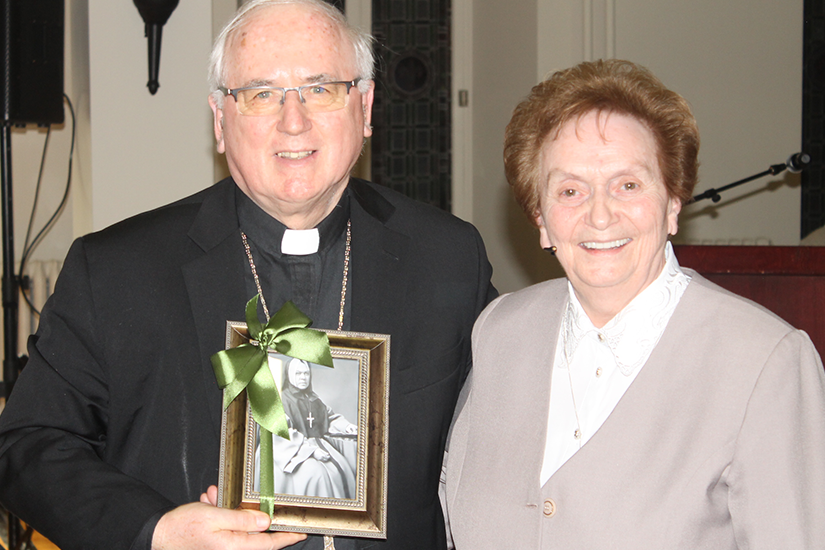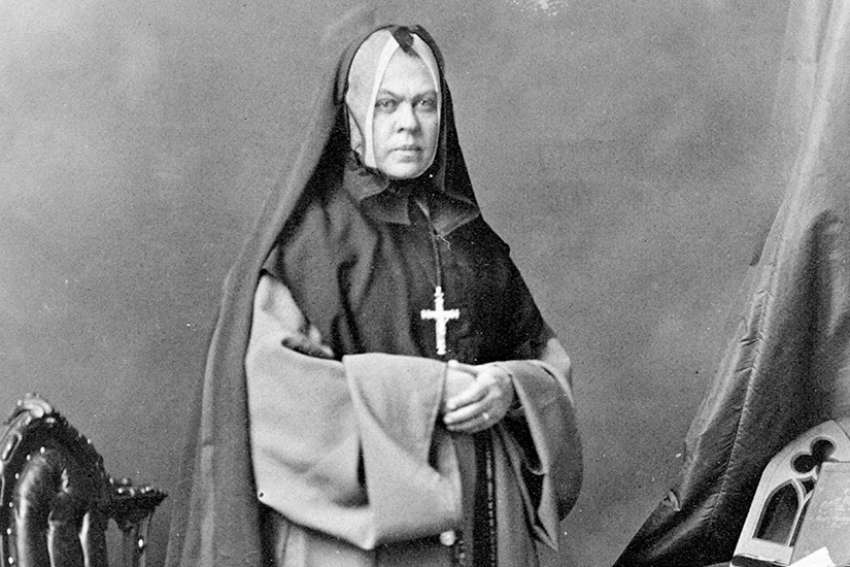On April 14 the Pope declared Mother Elizabeth Bruyère venerable, the first of three steps to sainthood.
“Today is not only a great day filled with emotion and pride for the Sisters of Charity of Ottawa, it is also a day filled with joy for the whole Church,” said general superior Sr. Rachelle Watier in a statement. “The sanctity of her virtues has been officially recognized.
“This is also a great day for the city of Ottawa, for Canada, for the 185 locations where the Sisters of Charity of Ottawa have been active in our country,” she said.
Watier called Bruyère a woman ahead of her time. She arrived in Bytown in 1845, a decade before the village was renamed as the City of Ottawa. Within five months, the 27-year-old nun “changed the face of the village” by establishing “a whole network of social services that were greatly needed.”
Bruyère founded a boarding school and used the proceeds to create a “social safety net” to care for the poor and sick. Within three years she initiated construction of Ottawa’s first hospital.
Typhoid and other communicable diseases were rife among the Irish and “no one wanted to help them, Watier said. Bruyère, however, sent her sisters to help.
“She initiated social changes that benefitted not only Ottawa but the whole world,” said Watier, referring to how the congregation expanded over the years and now serves in the United States, Brazil, Japan, Lesotho, South Africa, Malawi, and Zambia.
Born on Mar. 19, 1818 in L’Assomption, Que. outside of Montreal, Bruyère joined the Grey Nuns of Montreal in 1839 and made her vows in 1841. Four years later she was sent with five other sisters to Bytown, a bustling logging community experiencing an influx of Irish refugees. Instructed to found a school for French Canadians, Bruyère realized Irish children also needed an education, so she created Canada’s first bilingual school. It was an era when inter-cultural mixing was not the “in thing,” said Watier.
Bruyère was a visionary who showed great willpower, administrative skills and the ability to handle money, Watier said.
“You could not say she was promoting feminism, but she was a feminist by just being,” said Watier. Bruyère “felt good about who she was,” and knew “she was equal to everyone.”
“If there was something that touched the sisters or touched the poor, she would just come out and say, ‘I don’t think that’s right,’” Watier said.
She also refused to accept the paternalist mindset or ways of her time.
“She was polite but was not afraid to assert her equality with men, who were at the time very powerful and influential,” Watier said.
 Ottawa Archbishop Terrence Prendergast holds a photo of Sisters of Charity of Ottawa founder Mother Élisabeth Bruyère. With him is Sr. Rachelle Watier, general superior of the order founded by Mother Bruyère, who was declared venerable by Pope Francis April 14, a step on the path to sainthood. (Photo courtesy of the Sisters of Charity of Ottawa)
Ottawa Archbishop Terrence Prendergast holds a photo of Sisters of Charity of Ottawa founder Mother Élisabeth Bruyère. With him is Sr. Rachelle Watier, general superior of the order founded by Mother Bruyère, who was declared venerable by Pope Francis April 14, a step on the path to sainthood. (Photo courtesy of the Sisters of Charity of Ottawa)
Ottawa Archbishop Terrence Prendergast praised the great contributions Bruyère made to both the city and the Ottawa diocese, which was founded in 1847.
“Mother Bruyère and the Sisters of Charity initiated and founded several of the charitable institutions that continue to be very present and active in our community, especially in health and education,” said Prendergast.
“Mother Bruyère’s ministry, her life of prayer and heartfelt devotion towards helping the neediest, reflect God’s love for us all.”
The congregation is now hoping for a recognized miracle credited to Bruyère’s intercession, the next step before she can be called blessed. A second miracle is required before she could be canonized.
The Centre for the Cause of Elizabeth Bruyère has published a bilingual booklet called “Echoes” that features excerpts from her writings, stories from her life and accounts of the early years of the mission. It includes samples of prayers asking for Bruyère’s intercession.
Watier estimates the worldwide congregation numbers about 475 sisters, with about 235 in Canada. New vocations primarily come from the missions in Africa. The Canadian sisters are growing older, with many now over 80 years old.
Today the charism of Bruyère is most closely lived out in the developing world. The challenge in Canada, Watier said, is addressing “a lot of hidden poverties we can’t see anymore.”
If Bruyère were alive today, she would say, “go out to those hidden poverties,” Watier said.


